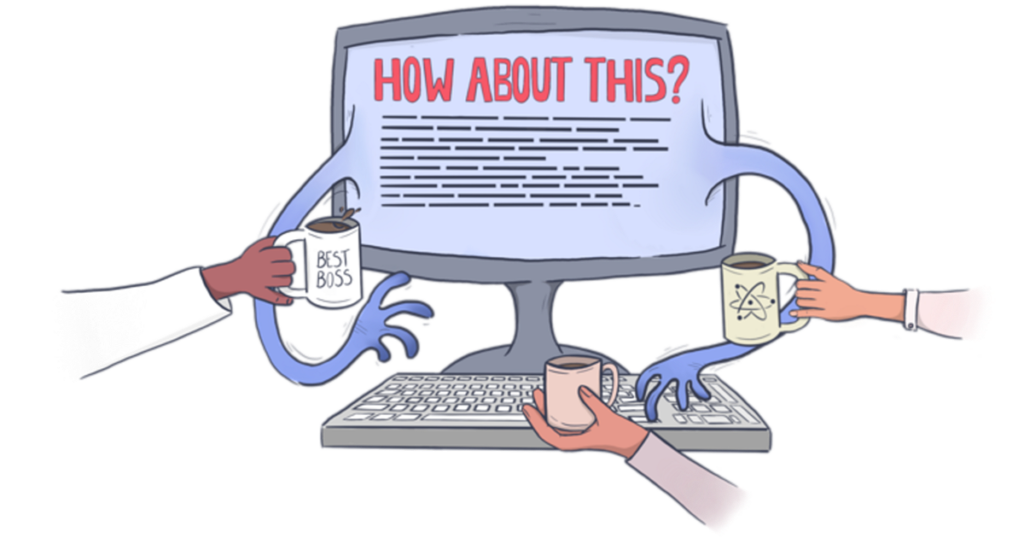If passable high-school papers can be written by chatbots such as ChatGPT, will more and more people graduate without ever mastering basic communication?
This article explores how a lack of reading/writing skills could translate to a loss of critical thinking skills and how English and Communications teachers (and curriculum developers at large) need to shift the assessment criteria for papers.
Readers will learn the importance of observations and having defensible opinions.
If people lack these skills, they may be less likely to make informed decisions to the detriment of themselves and society.
Critical thinking vs regurgitation: how ChatGPT will shape our future
Until recently, the essay was one of the preferred methods of testing “a student’s knowledge and writing skills” (1).
But then we invented AI chatbots, like ChatGPT, that can literally read and write for us.
ChatGPT can consume and paraphrase texts and churn out clear, factual, and logical writing in response to prompts (2).
We’ve reached a point where AIs can do what students are asked to do. The way forward is for curriculum developers and educators to adjust what they require of students. Original and critical thinking needs to be a minimum for a passing grade. This criterion is not solely about discouraging cheating: something much more important is at stake.
Addressing the fundamental concerns over ChatGPT: how to evaluate essays
Overall, technology like ChatGPT raises real concerns for academic integrity and student ability.
If chatbots can write passable high-school papers, will more and more people graduate without ever having mastered basic comprehension and communication skills?
Even if high schoolers use ChatGPT to write every assignment, they seem literate enough to text, share tweets, and otherwise consume/create social media. Basic literacy is not under threat.
Critical thought:
Original thinking and criticality are facing greater risks.
If ChatGPT can write a “lucid, well-researched and decently referenced” paper for an English class (1), then sounding natural and being well-referenced can no longer be the threshold for a passing grade. To differentiate themselves from AIs, students need to demonstrate critical and original thinking.
What are the capabilities and limitations of ChatGPT?
ChatGPT is an extensive language model AI that “creates text by trawling through billions of words of training data and learning how words and phrases relate to each other” (1). Through the sheer volume of “training data” they are fed, ChatGPT cannot only draw on vast amounts of factual information but also learns the “nuances and complexities of human language” (2).
In a 2022 study, ChatGPT was asked to generate university-appropriate questions, answer the questions, and then evaluate the answers. The experimenter concluded that because of the accuracy, coherency, relevance, and logic demonstrated by ChatGPT, the AI can have an “advanced level of analysis” (2).
Yet the AI’s responses fell short on two levels: original voice and original thinking.
What are the shortcomings of ChatGPT?
A trained academic might notice that ChatGPT’s “answers” brought nothing new to the questions. The AI endlessly recycled the words used in the prompts so that responses seemed cyclical or redundant.
Moreover, since ChatGPT is guided only by the words in the prompt, the AI could not provide any specific, external evidence for its “argument.” (Interestingly, this shortcoming was identified by the AI itself when it was tasked with evaluating its own responses).
These shortcomings come down to ChatGPT’s reliance on factual information. It recites what is already known, whereas true originality demands that we leap from known to unknown, from fact to theory.
Original thinking—making new ideas—is not something ChatGPT can generate intentionally (2). And the art of writing will change and evolve, as it should, in response to our environment.
Why do students need to do what ChatGPT and other AIs cannot
An academic integrity researcher at Imperial College London believes that ChatGPT-generated essays will “out themselves” by including misquotes, irrelevant references, or incorrect information.
On the one hand, these errors can be fixed.
On the other hand, should they be fixed?
Even in its current phase, some say that ChatGPT’s writing is “so lucid, well-researched and decently referenced that some academics call the bot the death knell for conventional forms of educational assessment” (1).
Indeed, universities in Australia now require students to write their exams with pen and paper in person. The move comes after “a few” AI-written essays were submitted as original work. The essays were described as “generally of a low standard”, but the new policy comes in anticipation of what these AIs could very well be capable of in the future (3).
Even if ChatGPT could generate 100% error-free prose, however, it would not be able to produce original thinking.
Thus, the essay and other “conventional forms of assessment” aren’t dead—even if the current evaluation criteria might be. Still, writing high-quality, original, and thought-leadership content takes time, as we discuss here, even if assistive tools are at our disposal.
Work smarter, not harder: changing the rubrics in a responsible way
Educators need to test accordingly for the kind of conclusions that ChatGPT can’t draw.
First, if something reads as though an AI could have written it, then treat it as such. Second, if a paper doesn’t have an argument or demonstrate original thinking, then maybe it should get a fail.
Should today’s students be expected to develop a profound, paradigm-shifting thesis?
Perhaps not.
We don’t want to make curricula more difficult; high school students have enough pressure at this point.
Even so, the presence of original ideas represents thinking that can’t be easily replicated by an AI. The conclusions we draw from the information need a heavier grade weight than the summary and recitation of information.
Standards will need to evolve with AI technology
Shifting standards to suit the climate is common practice. In parts of Canada, the public school curriculum is placing a new emphasis on science, computer studies, and technology to provide “critical life and job skill” that align with “current economic needs” (4; 5).
The European School System (ESS) is “constantly evolving and adapting to educational and operational challenges.” These challenges include the enlargement of the EU, the addition of new schools to the ESS, and the consequent increase in multilingualism (6).
Updating the standards of essay grading follows the same pattern. New rubrics shouldn’t make things harder for students, but they should shift the expectations to assess what is needed.
“Academics could respond [to ChatGPT],” says Arvind Narayanan, a computer scientist at Princeton University, “by reworking written assessments to prioritize critical thinking or reasoning that ChatGPT can’t yet do. This might ultimately encourage students to think for themselves more, rather than to try and answer essay prompts” (1).
Why we need to draw our own conclusions—in school and in life
Original thinking and drawing profound conclusions aren’t only relevant for academics.
The skill is a prerequisite to navigating life as a responsible adult.
When writing an essay on George Orwell’s 1984, it may not seem like one is developing a life skill. But if students are encouraged to draw their own conclusions in school, they may be more likely to think for themselves later in life.
If people don’t think for themselves, then they may be less likely to make informed decisions to the detriment of themselves, their businesses, and society at large.
The importance of living in a shared reality
At this point, the world is still facing the fallout of America’s 45th President. According to renowned political commentator Fareed Zakaria, the seduction of populism is overcoming the democratic values of shared reality and reason. As a consequence, America is more divided than ever. Britain, which has seen four Prime Ministers in as many years, is struggling to navigate its post-Brexit identity. Israel, Brazil, and Argentina are reverting to hardline, nationalistic policies (7).
Original thinking is a solid defense against divisive, rabbit-hole rhetoric. Therefore, curriculum developers and educators worldwide need to encourage critical thinking in a widely accessible setting: public school.
Critical thought:
ChatGPT can do much to optimize communication, but it also teaches us about the irreplaceability of our own thoughts.
Consequently, AI has forced us to reconsider what reading and writing are really about.
So, as counter-intuitive as it sounds, this technology might be the best thing to have happened to original thinking in a long time.
References
- Stokel-Walker, C. (2022). AI bot ChatGPT writes smart essays – should professors worry? Nature (London). https://doi.org/10.1038/d41586-022-04397-7
- Susnjak, T. (2022). ChatGPT: The End of Online Exam Integrity? ArXiv.
https://doi.org/10.48550/arxiv.2212.09292 - Cassidy, C. (2023). Australian universities to return to ‘pen and paper’ exams after students caught using AI to write essays. The Guardian. Retrieved from: https://www.theguardian.com/australia-news/2023/jan/10/universities-to-return-to-pen-and-paper-exams-after-students-caught-using-ai-to-write-essays
- Government of Ontario. (2022). Ontario Modernizing Computer Studies and Tech-Ed Curriculum to Ensure Students Are Prepared for the Jobs of the Future. Retrieved from: https://news.ontario.ca/en/release/1002583/ontario-modernizing-computer-studies-and-tech-ed-curriculum-to-ensure-students-are-prepared-for-the-jobs-of-the-future
- Government of Ontario. (2022). Ontario Modernizing School Science Curriculum. Retrieved from: https://news.ontario.ca/en/release/1001722/ontario-modernizing-school-science-curriculum
- Gausas, S. et al (2022). Research for CULT Committee – The European Schools System: State of Play, Challenges and Perspectives. European Parliament, Policy Department for Structural and Cohesion Policies. Retrieved from: http://www.europarl.europa.eu/thinktank/en/document.html?reference=IPOL_STU(2022)699647
- Zakaria, F. (2023). Fareed’s take: Populism’s false promises. (15, 1) [Tv series episode]. In T. Goldstone (Executive Producer), Global Public Square. CNN.


